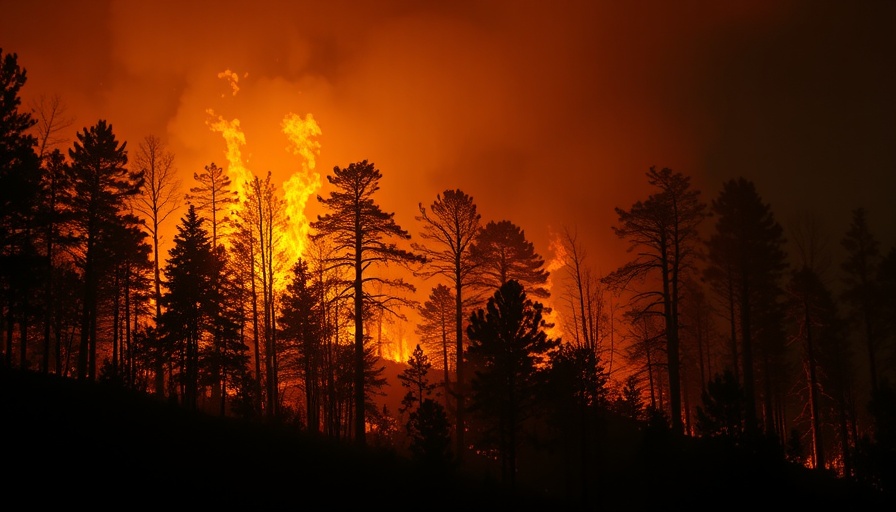
Wildfires Spark State of Emergency in Western North Carolina
The heart of western North Carolina is currently facing an unprecedented challenge as new evacuation orders and a state of emergency have been enacted. Governor Josh Stein has undertaken these measures to bolster the state's response capacity amidst rapidly expanding wildfires. This state of emergency primarily encompasses the regions stretching west from the Interstate 77 corridor to the Tennessee border, signifying serious fire threats as communities brace for the potential impact.
In 'NC State of Emergency activated as evacuation orders issued due to wildfires', the discussions underscore the ongoing intensity of wildfire threats affecting both North and South Carolina, prompting an analysis of safety measures and community resources.
Fire Activity Escalates in North and South Carolina
In recent developments, area residents have been alerted to the growing threat of wildfires. In the upstate region of South Carolina, two significant wildfires have been reported, with alarming growth in size over the last 24 hours. The Table Rock fire has seen its size double, while the Persimmon Ridge fire has tripled, underscoring the urgency of the situation. Hot weather and high winds are exacerbating these conditions, sending flames away from the established fire lines. Emergency response teams are diligently working to open fire breaks reminiscent of the devastating Pinnacle fire that started in 2016, which burned for nearly three weeks and consumed over 10,000 acres.
The Precarious Nature of Current Fires
Tonight, residents living near the Cove Complex fire in North Carolina have also received evacuation orders as local law enforcement identifies this fire as a high-priority concern in the Southern U.S. The Black Cove and Deep Woods fires are each approximately 3,000 acres in size, standing at 0% containment. As the situation unfolds, communities have begun adopting the 'Ready, Set, Go' evacuation strategy often used in fire-prone regions of the Western United States. Residents of the city of Celuda are now urged to prepare—gathering essential items as they ready themselves for potential evacuation.
Significant Historical Context
The Pinnacle Mountain fire serves as a chilling reminder of what can occur when fire conditions align with human activity. Beginning from a simple campfire, it escalated into the longest, largest, and costliest fire in upstate history, leading to comprehensive changes in how local governments approach wildfire prevention and response. This history profoundly impacts local emergency protocols, enhancing preparedness today amid contemporary threats.
The Role of Weather and Environmental Factors
Current weather conditions are a primary factor fueling these wildfires. Favorable weather patterns for extreme fire behavior have been reported, posing increasing challenges for firefighting teams. Climate conditions can further complicate these scenarios, requiring robust response strategies to protect both lives and property. Understanding local weather trends is essential for effective fire management and community safety.
Community Preparedness Strategies
Fire officials are working tirelessly, employing every resource available, including aerial support. The deployment of a DC-10 air tanker to drop thousands of gallons of fire retardant indicates the vigorous efforts underway to combat these growing blazes. Evacuation orders and community awareness campaigns play a critical role in ensuring resident safety and minimizing casualties. As the scope of these fires increases, timely communication and drive for preparedness become more crucial than ever.
Conclusion: Why This Matters
The wildfires raging in North Carolina highlight the need for widespread community engagement and preparedness. Residents are encouraged to stay informed through local news updates, connect with mental health resources for stress management—especially amid ongoing crises, and consider upcoming wellness events designed to foster resilience in the community. Preparedness isn't only physical; mental health plays a significant role in how individuals and families cope with emergencies like these.
Take Charge of Your Health and Well-being
Residents of Charlotte are reminded to stay updated with local authorities regarding the wildfires and their impacts. As these fires rage, it's essential to engage with local wellness initiatives, such as stress management workshops and family-friendly yoga classes, to maintain mental and emotional health during these challenging times. Whether seeking the best mental health counselors in Charlotte, or participating in community events, each step contributes to personal and communal resilience. The necessity for consistent efforts to prioritize well-being cannot be understated; stay safe and stay engaged!
 Add Row
Add Row  Add
Add 




Write A Comment